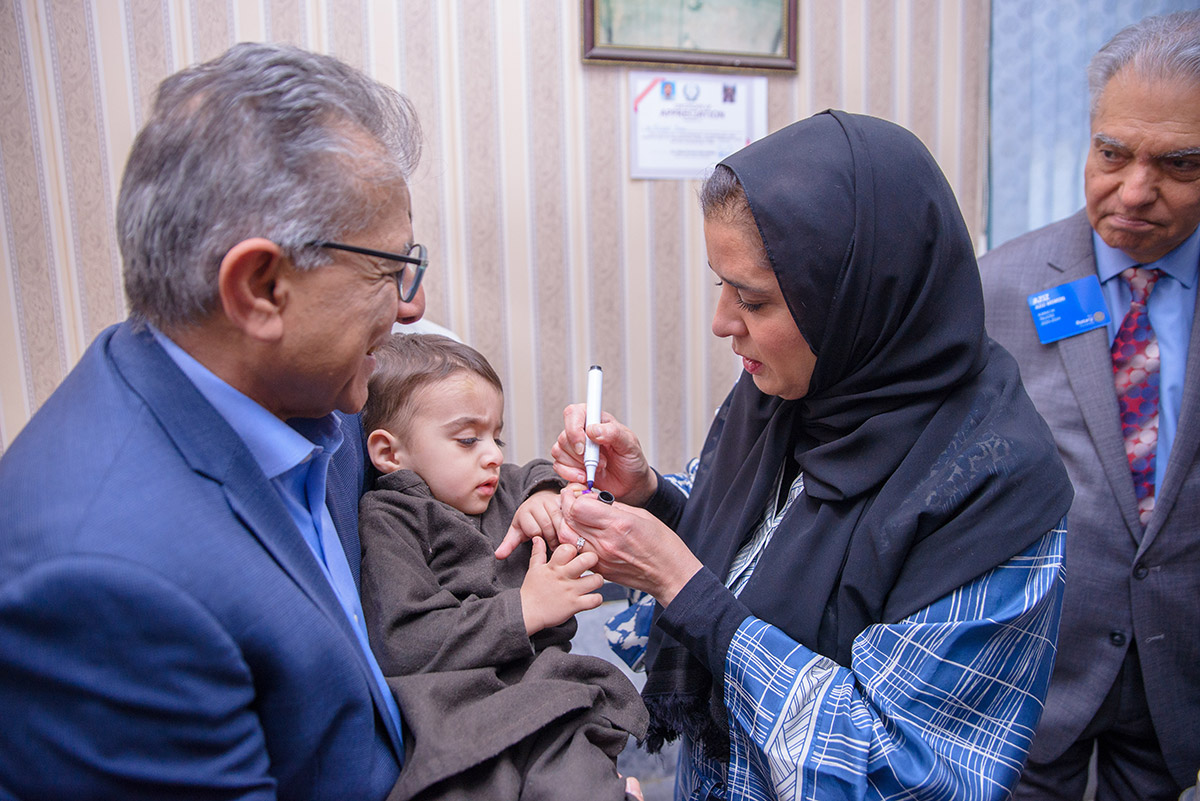 WHO Regional Director Dr Hanan Balkhy marking the finger of a child with ink after being vaccinated against polio in Pakistan.
WHO Regional Director Dr Hanan Balkhy marking the finger of a child with ink after being vaccinated against polio in Pakistan.
Islamabad, 7 May, 2024 – WHO's Regional Director for the Eastern Mediterranean, Dr Hanan Balkhy, has concluded her inaugural visit to Pakistan. The comprehensive five-day mission spanned Islamabad, Peshawar and Lahore, and included high-level meetings with government officials, visits to WHO-supported health facilities, and participation in the subnational polio vaccination campaign.
This was also Dr Balkhy’s first visit as part of the Global Polio Eradication Initiative’s high-level polio delegation, led by the Chair of the Polio Oversight Board and with representatives from the United States Centers for Disease Control, United Nations Children’s Fund and Rotary International. The high-level polio delegation met with Prime Minister Shehbaz Sharif, Coordinator to the PM on National Health Services Dr Malik Mukhtar Ahmad Bharat, and chief ministers, chief secretaries and health ministers of Khyber Pakhtunkhwa and Punjab.
The polio delegation learned about progress, challenges and the strategies employed by the programme to end polio in Pakistan, which is one of the last two countries globally with endemic transmission of wild poliovirus. The delegation emphasized the critical need to reach all children during vaccination campaigns, enhance coordination with Afghanistan’s polio programme, and intensify efforts to improve routine immunization coverage.
“While Pakistan has made significant strides in epidemiological progress, backed by a strong disease surveillance system, it is essential to further strengthen and integrate polio eradication with essential immunization programs while we contribute to building stronger overall public health capacities,” said Dr Balkhy.
At a meeting with the Coordinator to the Prime Minister on National Health, Dr Balkhy highlighted Pakistan's complex health landscape, citing recurring disease outbreaks exacerbated by floods in Sindh and Balochistan. She also discussed her new flagship initiatives for the Region, aimed at ensuring equitable access to medicines and effective supply chain management, boosting investment in the health workforce and tackling substance use.
Dr Balkhy emphasized WHO’s commitment to bolstering primary health care systems and reducing communicable diseases such as HIV infections as well as noncommunicable diseases such as diabetes, while recognizing Pakistan's potential in the medical supply chain.
In Khyber Pakhtunkhwa, Dr Balkhy learned about WHO’s initiatives to strengthen primary health care systems and advance universal health coverage in the context of a province prone to multiple health and climatic disasters, and with endemic transmission of wild poliovirus. She addressed a training on Integrated Disease Surveillance and Response systems in Peshawar and inaugurated the Neonatal Intensive Care Centre, Nutrition Centre and waiting area at the District Headquarter Hospital in Haripur.
“More than 50% of neonatal deaths in the Eastern Mediterranean Region are reported from Pakistan,” Dr Balkhy explained. “The facilities in this centre will play an important role in addressing gaps in accessibility of neonatal care for children in the catchment community.”
In addition to visiting WHO-supported health facilities, Dr Balkhy also engaged with female vaccinators at the Civil Dispensary in Peshawar. She learned about the work of lady health workers and community-based vaccinators who go door to door during each campaign to deliver polio and other antigens.
“I was delighted to engage with women at the forefront supporting routine immunization efforts in Peshawar,” Dr Balkhy said. “Their motivation in the face of incredible challenges was inspiring. Their role is more than just administering vaccines; they are educating mothers and caregivers, in turn empowering them with critical health information.”
In Lahore, Dr Balkhy learned about innovative health initiatives to boost routine immunization rates across the province, including in remote villages of Punjab, through mobile health clinics and digitized data management systems for microplanning and birth registrations.
Together with WHO Representative Dr Luo Dapeng and UNICEF’s Regional Director for South Asia, Mr Sanjay Wijesekera, Dr Balkhy met with the UN Resident Coordinator, Mr Mohammad Yahya, in Islamabad. They discussed the very challenging economic and fiscal situation of the country, humanitarian issues and mutual areas of support to improve accessible health care and eradicate polio in Afghanistan and Pakistan. Stronger partnerships as “One UN” are key to addressing multifaceted challenges for a country of over 220 million people.
Dr Balkhy also visited the Regional Reference Laboratory for Polio at the National Institutes of Health (NIH) in Islamabad, where she learned how WHO-accredited labs for poliovirus and rotavirus and a subregional lab for measles and rubella support disease surveillance in Pakistan and Afghanistan. Her discussion with Dr Muhammad Salman, CEO of NIH, highlighted the critical importance of antimicrobial resistance.
During her visit to WHO’s Country Office, Dr Balkhy met with WHO staff and donated health supplies to national focal points from the Khyber Pakhtunkhwa and Azad Jammu and Kashmir health departments to advance universal health coverage. She thanked the country team for their work in responding promptly to emergencies, strengthening health infrastructure and providing crucial capacity-building support to strengthen Pakistan’s health workforce.
“WHO stands committed to supporting Pakistan’s national health vision, aiming for universal health coverage through equitable and sustainable services. Our support remains unwavering as we strive to reduce public health risks, eradicate polio, and strengthen Pakistan’s health system through intensified coordination and mobilization of global, regional and national resources,” Dr. Balkhy said.
Selected photos from the mission
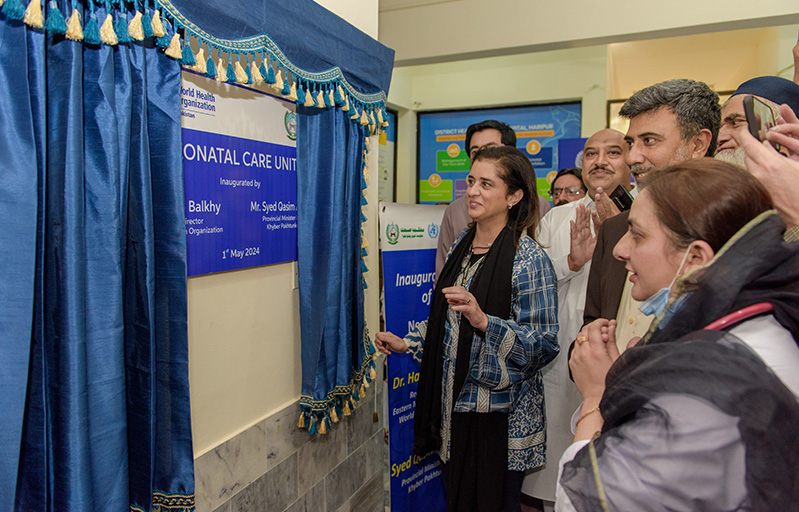 WHO Regional Director Dr Hanan Balkhy inaugurating the Neonatal Intensive Care Centre at the District Headquarter Hospital in Haripur, Pakistan.
WHO Regional Director Dr Hanan Balkhy inaugurating the Neonatal Intensive Care Centre at the District Headquarter Hospital in Haripur, Pakistan.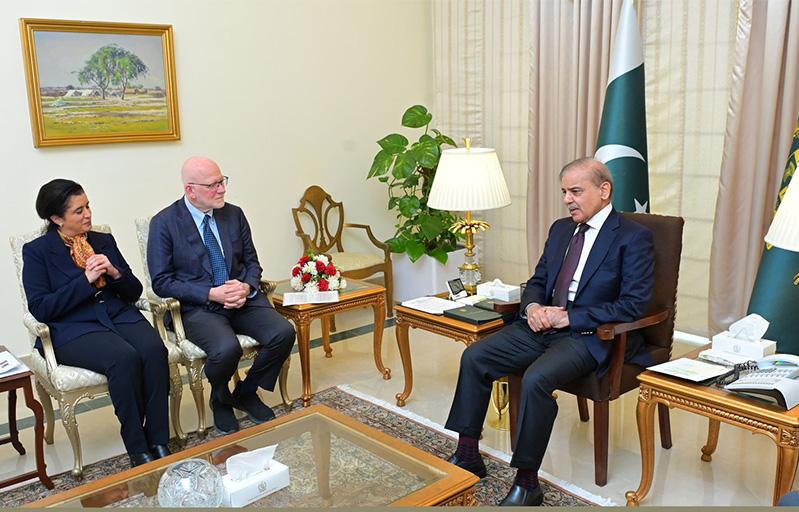 WHO Regional Director Dr Hanan Balkhy and Dr Chris Elias president of Global Development at the Bill & Melinda Gates Foundation meeting Mr Shehbaz Sharif (right), Prime Minister of Pakistan.
WHO Regional Director Dr Hanan Balkhy and Dr Chris Elias president of Global Development at the Bill & Melinda Gates Foundation meeting Mr Shehbaz Sharif (right), Prime Minister of Pakistan. 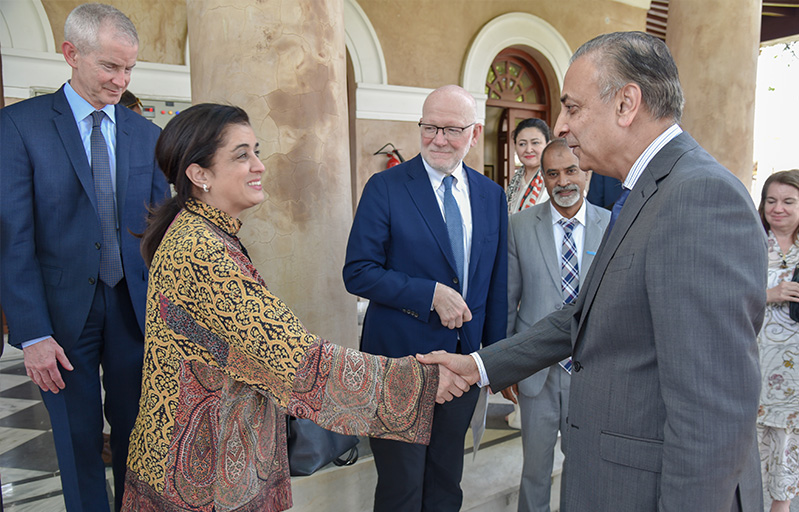 WHO Regional Director Dr Hanan Balkhy with Zahid Akhtar Zaman, chief secretary of Punjab, Pakistan.
WHO Regional Director Dr Hanan Balkhy with Zahid Akhtar Zaman, chief secretary of Punjab, Pakistan.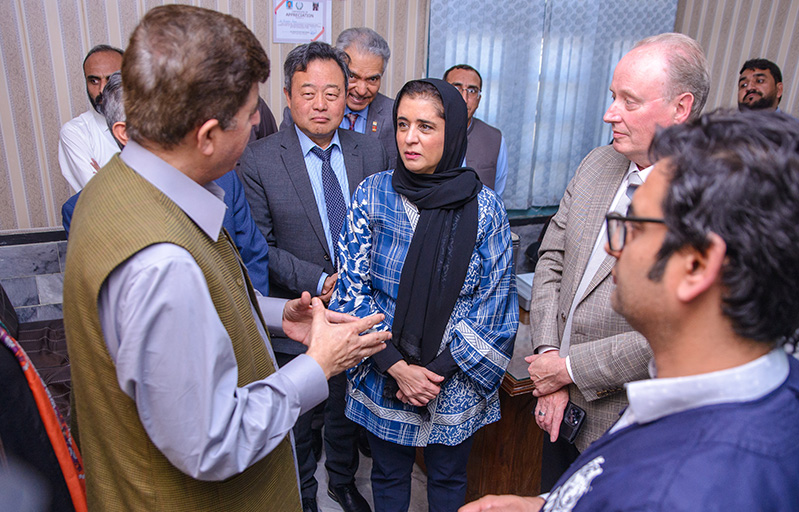 WHO Regional Director Dr Hanan Balkhy at the civil dispensary in Gulbahar, Peshawar, Pakistan.
WHO Regional Director Dr Hanan Balkhy at the civil dispensary in Gulbahar, Peshawar, Pakistan.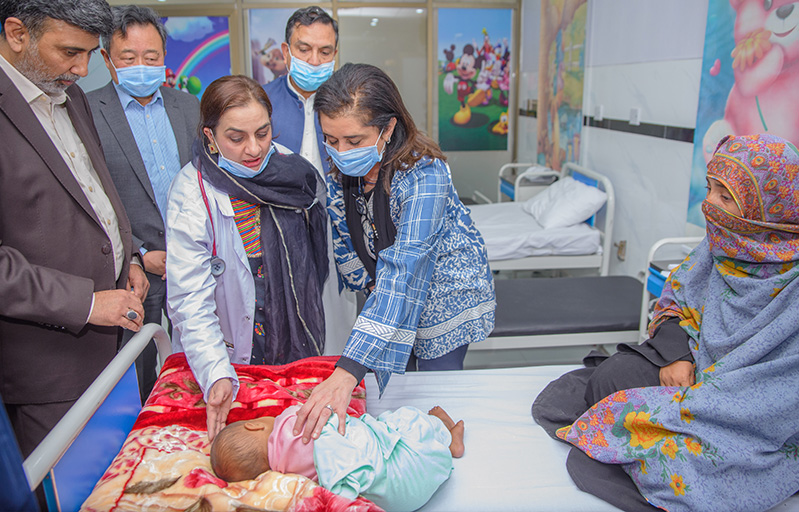 WHO Regional Director Dr Hanan Balkhy at the Neonatal Intensive Care Centre at the District Headquarter Hospital in Haripur, Pakistan.
WHO Regional Director Dr Hanan Balkhy at the Neonatal Intensive Care Centre at the District Headquarter Hospital in Haripur, Pakistan.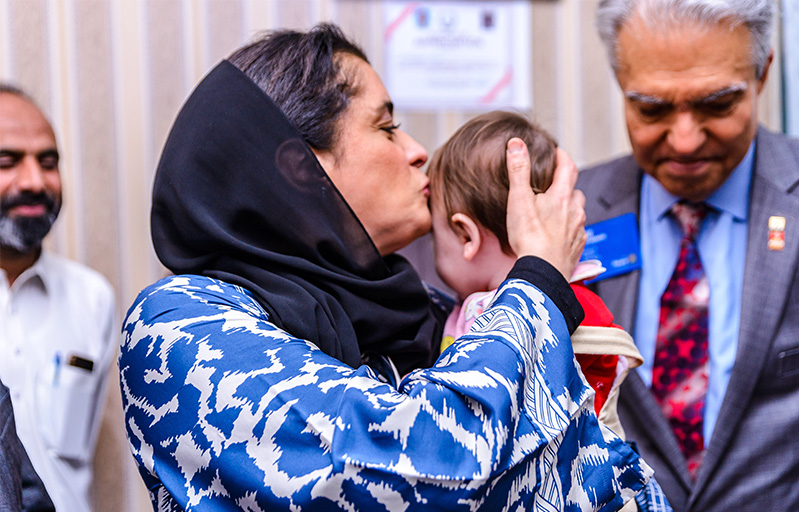 WHO Regional Director Dr Hanan Balkhy at the civil dispensary in Gulbahar, Peshawar, Pakistan.
WHO Regional Director Dr Hanan Balkhy at the civil dispensary in Gulbahar, Peshawar, Pakistan.



